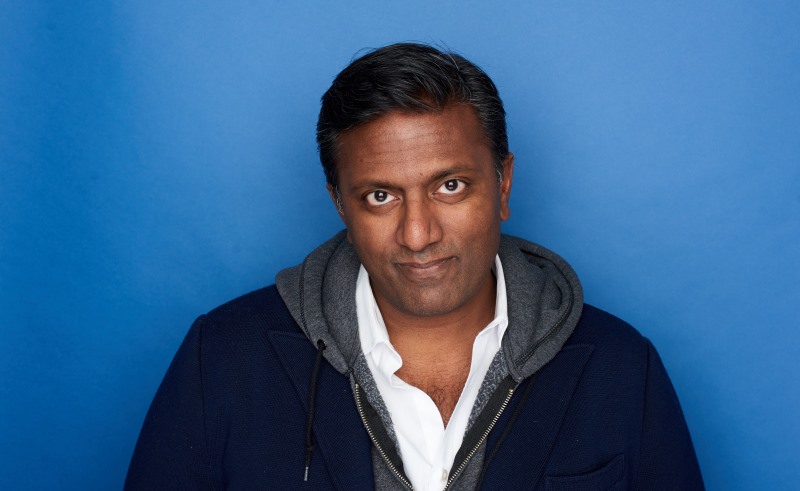1776's President Peter Cherukuri: "Startups Need To Learn Regulatory Hacking to Succeed"
"98% of startups fail if their mindset is that of an investment vehicle,” says the president of massive global startup incubator 1776. In an exclusive interview with Charlotte Swan, the investor explains why startups need to change their paradigm to succeed today.

"Never before in human history, with the possible exception of the atom bomb, has our technological advance run faster than our moral processing power," said Walter Isaacson. We’re embarking on a journey towards an unfamiliar horizon where business, technology, and legislature do not yet neatly coexist alongside one another. As the president and Chief Innovation Officer of one of the world's most disruptive startup incubators, 1776, Peter Cherukuri knows like no other that the road to success has never been quite so complex.
“There’s this stack of disruptive technologies such as AI, blockchain, mixed reality, automation, autonomous vehicles, that are fundamentally game-changing and create the type of global uncertainty that I think we’re going through right now,” he says. “You’re going from science fiction to science fact - that it’s not just our ‘moral processing power,’ in the words of Isaacson; it’s our economic processing power. We can’t comprehend it! We’re not able to really think through what’s at stake and how the moral implications of these technologies relate to how we live our lives and determine the role of government, the role of corporations, institutions, as they try to grapple it.”
You’re going from science fiction to science fact - that it’s not just our ‘moral processing power,’ in the words of Isaacson, it’s our economic processing power.
The incubator, founded by serial entrepreneurs Evan Burfield and Donna Harris, started off in 2013 as an unorthodox and game-changing accelerator - indeed, it is no coincidence their Headquarters are strategically located in Washington, two blocks away from the White House - dubbing itself the place “where revolutions begin.” In 2014, US former president Barak Obama himself visited the startup accelerator to meet entrepreneurs. According to Cherukuri, the role of startups in the international landscape is changing. In order to harness the power of emerging technologies while optimising growth and harmoniously coexisting with regulatory authorities as well as corporations, startups are going to have to learn new strategies for success.

The recent partnership of 1776 with Smart Dubai office for the Blockchain Challenge is a concrete example of regulatory hacking, Cherukuri says.
Regulatory hacking is key. But what is it?
Cherukuri introduces a concept he calls regulatory hacking, which 1776 defines as “a strategy combining public policy and alternatives to traditional marketing for startups to successfully scale in the next wave of the digital economy.” Government regulation is a significant factor affecting the impact a startup can achieve, no matter the country, no matter the industry. “There are startups in healthcare, energy, defense, smart city space, who really need to understand the role that government has to play in their success as a company,” says the innovation hunter, who sees regulatory hacking as a critical element for success. To move ahead in a highly-regulated world, startups are going to have to find constructive ways to work with government agencies, or generate enough buzz with influential entities to incentivise change from policy officials which benefit their industries.
There are startups in healthcare, energy, defense, smart city space, who really need to understand the role that government has to play in their success as a company.
The recent partnership of 1776 with Smart Dubai office for the Blockchain Challenge was possible in part due to the city’s progressive outlook on the relationship between startups and government, an example of concrete regulatory hacking. Dubai’s commitment to transferring its official business to blockchain-powered systems by 2020 means the city needed to find a speedy method of sourcing innovation. SDO, a Dubai government initiative, called for startups utilising blockchain to enter a challenge with the potential for winners to partner with the officials to enact their solutions. “That’s very much a galvanising thesis of what they do as a city,” says Cherukuri. “They really have operationalised a [regulatory hacking] agenda and created accountability across the government and all other entities to this end. There is an absolute commitment to understanding the role that startups can play to achieving the innovation agenda for Dubai.”
Cherukuri cites Dubai Future Accelerators as an example for other governments to reference. It’s an intensive 9-week program that pairs startups with government organisations to brainstorm and implement solutions, using the city as a living matrix for testing. The accelerator program, which is chaired by the Crown Prince of Dubai, has “created a regular space where each of the fiscal entities of Dubai have an engagement with the startup community,” says Cherukuri, and fosters an environment that is collaborative and productive rather than adversarial. This kind of partnership models the concept of regulatory hacking in action.
98% of all startups fail if they use that mindset of being an investment vehicle.
Diverging from the Silicon Valley dream
Options for startup success aren’t limited to going for it alone or pairing with local government authorities. Cherukuri cautions entrepreneurs not to view their startups as investment vehicles. “Usually there’s this idea that they’re all going to become multibillionaires and have exits, collect big checks and move to Silicon Valley. That’s not realistic. 98 percent of all startups fail if they use that mindset of being an investment vehicle,” he declares. He advises entrepreneurs to adjust their thinking about how they want their startups to evolve, stressing that there’s more than one road to success.

1776 was an outgrowth of former US President Barak Obama's Startup America Initiative, which he visited himself in 2014.
Adding to the complication of such a narrow view is the fact that the flow of venture dollars is highly concentrated in certain areas in a way that restricts access for the rest of the world, limiting opportunities. “Is there a way that we can we connect and put a spotlight on startups and entrepreneurs and their ecosystems in a way that creates more opportunity?” muses the investor. “Maybe it doesn’t change the flow of capital, but it may change the direction of the outcome. Maybe it’s another direction where a startup finds a customer, maybe it’s another direction where they have a pilot, maybe it’s another direction where they get acquired by a corporation or even with a government entity.” For that 98 percent of startups that don’t become legendary success stories, there are other options, and they may not be the stereotypical success stories, but they’re not tales of failure either.
Technology innovators have more than one path to security and success than staying solo and scoring investments. There are other positive outcomes besides the ever-present unicorn startup dream. “Startups aren’t investment vehicles, they’re discovery vehicles,” asserts Cherukuri. “They’re becoming a kind of new form of R+D for corporations, institutions, governments to understand how to harness new technologies. You can look at them more as discovery vehicles to apply their value proposition to specific projects, and there’s another set of outcomes you might have with them besides this siren song of becoming insanely wealthy.”
Startups aren’t investment vehicles, they’re discovery vehicles. They’re becoming a kind of new form of R+D for corporations, institutions, governments to understand how to harness new technologies.
Making professional connections and partnerships is key. “We need to have discipline and process, we need to connect all these startups, to bring startups to places like Dubai to work with their government as well as other organizations that they’ll need to buck the 98 percent failure trend,” continues the entrepreneurship expert.
According to Cherukuri, startups are in a unique position to discover and shape the future of business and technology. "As startups, you have a chance to address some really big challenges that our world is going through right now. It is through lens of those disruptive technologies on top of the changing role of startups that I think is really important as a framework for us to understand the role these new technologies will play in our daily lives."
Main image courtesy of 1776.
- Previous Article Bassita: Click Funding for a Better Egypt
- Next Article Giga Works - A Story of the Middle East’s First Virtual Reality Filming Startup






















